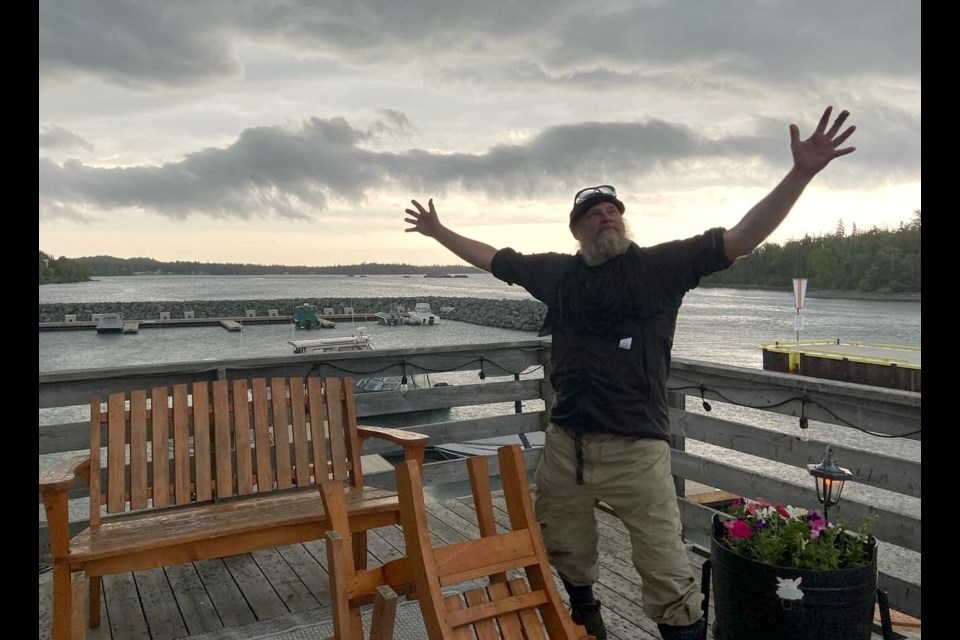A Minneapolis man who survived the capsizing of his kayak on Lake Superior is back home with even greater respect for the big lake, and plenty of gratitude to the friends and strangers who bailed him out.
Jeff Johnson has lots of experience on the water, having paddled on Superior and in different places around the world for 30 years.
But on June 17, a near-disaster reminded him of the importance of proper preparation.
"I'm the American dip — in this story," he said.
While paddling his 18-foot kayak between Pie Island and Thunder Cape at the foot of the Sleeping Giant, he encountered three-to-four-foot swells, with smaller waves coming from the opposite direction while it was raining.
"I just dumped my boat. Lost control. And that's where you don't wanna be," Johnson said. "We've got to get me ashore because I'm sitting in a swamped boat. I'm essentially sitting in Lake Superior."
He and three companions, all lifelong paddlers, were on a multi-day expedition from Sturgeon Bay (south of Thunder Bay) to Rossport.
Things went well as they proceeded to Flatland Island, then on to Thompson Island, but June 17 brought his participation in the trip to what turned out to be a self-imposed halt.
"Monday was the not-so-great day," Johnson said. "Lake Superior got in the way. She does whatever she wants. You have to give Lake Superior all your respect, and she doesn't give anything back."
When the kayak submerged, his exit from the craft immediately put him at risk of developing hypothermia in water whose temperature, he said, was about 40 F or less than 5 C.
Johnson estimates he was immersed in the lake for up to ten minutes.
Getting back into the swamped craft would at least keep his head, heart and lungs out of the water, which turned out to be critical to his survival, as it took two-and-a-half hours to get to land.
"There's huge waves coming in ... So we have to 'raft up' three boats and take turns pumping with a hand pump. The back hatches are flooded, so we can't really get those as empty as we want. So we make the call right then, that we've got to get me to shore."
The group used teamwork and experience to accomplish that.
"We had two kayaks towing. My friend Patrick in lead has got a tow rope to David, and David's got a tow rope to me. Bill is helping me brace, and I'm holding half my paddle because my paddle broke in half...We have backup paddles but I used my half-paddle as a rudder, and it took us about 2.5 hours to get to the Sleeping Giant where we had a bit of protection so we could get the back hatches pumped out."
The challenge wasn't overcome just yet, he said.
"It's very critical that I get warm, and there's only two ways — get out of the boat and get dry, or start paddling. Since we still didn't have a safe harbour, I made the call and it was a good one. I'm gonna start paddling the swamped boat. It took about another hour to get to Tee Harbour and flat water."
Johnson said he was "pretty wrecked" at that point so the group put up a tent, he got into a sleeping bag where he shivered for an hour, but then was able to eat some hot food and fall asleep.
The next day, after the wind died down, they were able to paddle to Silver Islet where he broke the news to his friends that he wouldn't join them for the rest of the trip to Rossport.
"I'm a liability. I can't do this anymore. I'm a risk to my buddies, and these guys just saved my life. They were pretty bummed when I broke the news to them, but then a series of Canadian saints emerged."
First, Johnson met a woman who offered him a ride to Thunder Bay the next day, and arranged for her husband to bring him some food.
Next, Jeff Korkola emerged from the Silver Islet General Store.
"I was just going to pitch my tent on the side of the road, or right outside the store. The store is closed, and they're not meant for boarding."
But Korkola and his wife, Sandy, provided him with a bed, meals, and a chance to watch an Oilers/Panthers playoff game on TV that night.
Johnson said he was overwhelmed by their hospitality, "the intense level of generosity and their amazing level of emotional capital, to open up their home and give me a place to stay."
In Thunder Bay the next day, a helpful cab driver took him to Sturgeon Bay where he picked up his vehicle and drove to Rossport to reconnect with his companions.
He calls the incident on the lake a cautionary tale for all kayakers.
"The huge lesson here is training. You can be the best paddler in the world. Lake Superior doesn't care. You just have to train for the worst."
In retrospect, he feels he wasn't properly equipped for this particular trip.
"I'm just glad you're not writing an obituary," he said.
"This is a classic case of preparation, preparation, preparation. Make sure you've got beacons on your life-vest. And in my case, clearly I was under-geared. I was in two wetsuits, but all my buddies had drysuits, and I should have been in a drysuit. I just thought I don't need that, but I did. And the training that it takes for this, it's never enough."
Last year, after a Thunder Bay man experienced a similar ordeal in Lake Superior, he attributed his survival to his lifejacket and an emergency communicator.
